Standing in your Bellwood backyard, looking at the space where your new fence will go, you’re facing a classic homeowner dilemma: should you build the fence yourself or hire professionals? With 2025 material costs and labor rates, the answer isn’t as straightforward as it once was.
At Dubon Fencing & Polish Concrete LLC, a Bellwood fence company known for expert installation and honest pricing, we’ve helped hundreds of homeowners weigh this decision based on real costs and outcomes. Some DIY projects turn out beautifully and save thousands, while others end up costing more than professional installation after factoring in mistakes, time, and tool purchases.
Let’s break down the true costs of building versus buying a fence in Bellwood, so you can make the best decision for your situation and budget.
The Real Cost of DIY Fence Building in 2025
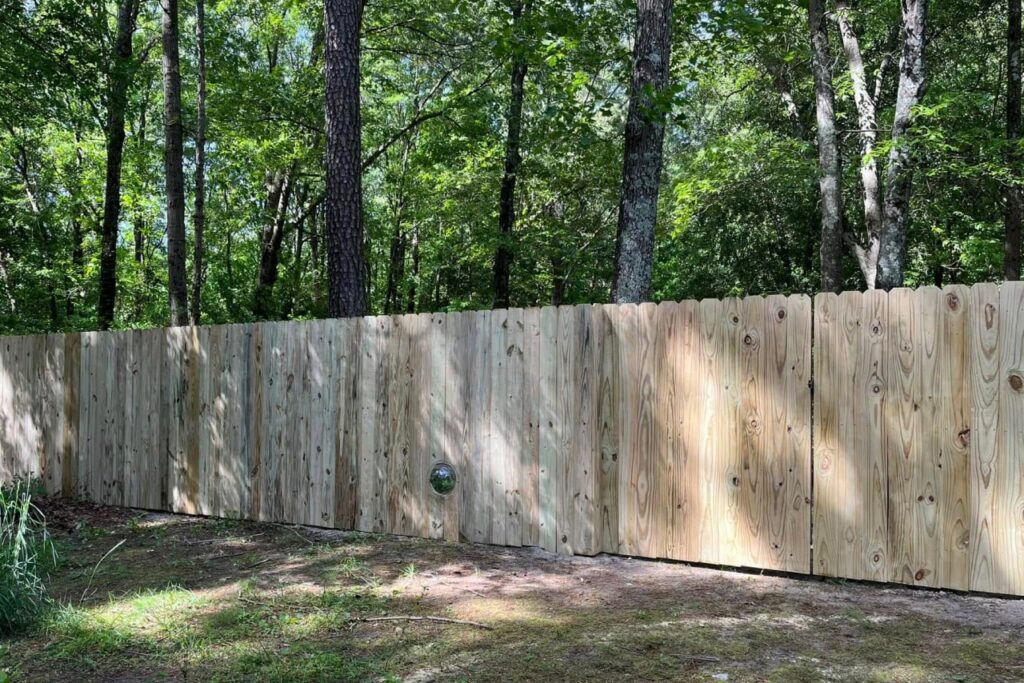
Building your own fence can save money, but the actual savings depend on several factors that many homeowners along Belmont Road, Cogbill Road, and Harrowgate Road underestimate. The materials alone represent only 50-60% of a professional fence installation cost, which means even if you get materials at the same price as contractors, you’re looking at potential savings of 40-50%.
Material Costs for DIY Projects
In 2025, expect to pay these prices for fence materials in the Bellwood area. A basic 6-foot privacy fence using pressure-treated pine runs approximately $8-12 per linear foot for materials only. Cedar fencing materials cost $12-18 per linear foot, while vinyl fence panels range from $15-25 per linear foot. Chain-link materials typically cost $4-8 per linear foot for a standard residential installation.
These prices assume you’re buying from Lowe’s in Chester, The Home Depot on Route 10, or 84 Lumber near I-95. Some Richmond-based lumber yards offer contractor pricing to homeowners, which can reduce costs by 10-15%, but selection may be limited.
Hidden Costs of DIY Fence Installation
Tool rental or purchase adds significant expense that many homeowners on Staton Drive or Ware Bottom Spring Road overlook. A post-hole digger rental costs $40-60 per day, while a power auger runs $80-120 daily. You’ll also need a level, string line, measuring tape, drill, circular saw, and safety equipment.
Concrete for setting posts costs $4-6 per bag, and you’ll typically need 1-2 bags per post depending on soil conditions. Hardware including screws, brackets, hinges, and latches adds $100-300 to most residential projects. Don’t forget about permits, which may be required in Chesterfield County depending on fence height and location.
Time Investment Reality Check
Most homeowners significantly underestimate the time required for fence installation. A weekend warrior approach typically requires 3-4 weekends for a 150-200 foot fence, assuming good weather and no major complications. This translates to 24-32 hours of actual work time.
Professional crews complete the same project in 2-3 days because they have specialized equipment, experience with local soil conditions, and efficient workflows. When you factor in your hourly earning potential, the time investment may offset much of the material savings.
Professional Fence Installation Costs in Bellwood
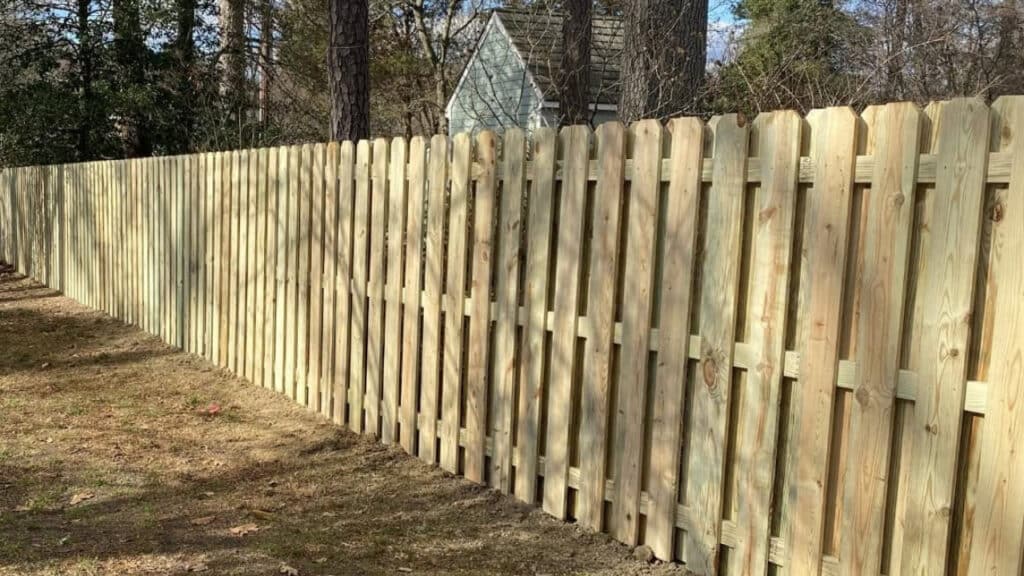
Understanding what professional installation actually costs helps you make an accurate comparison. In 2025, labor costs in the Richmond area have increased due to high demand and skilled worker shortages, but the value proposition remains strong for many homeowners.
Current Professional Installation Rates
For a standard 6-foot privacy fence, professional installation in Bellwood typically costs $18-28 per linear foot for wood fencing, $25-40 per linear foot for vinyl, and $12-20 per linear foot for chain-link. These prices include materials, labor, permits, and cleanup.
Factors that increase professional installation costs include rocky or challenging soil conditions common in parts of Bellwood, slopes or uneven terrain, removal of existing fencing, custom gates or hardware, and tight timeline requirements.
What Professional Installation Includes
Professional fence contractors provide comprehensive service that goes beyond just installing materials. Site preparation includes marking utilities through Miss Utility, surveying property lines, and preparing the ground for installation. Professional installation ensures proper post spacing, level installation, and compliance with local building codes.
Most reputable contractors also provide warranties on their work, typically one year on installation and pass-through manufacturer warranties on materials. This protection has real value if issues arise after installation.
Why Professional Costs Have Increased
Several factors have driven up professional installation costs in 2025. Skilled labor shortages mean contractors can command higher wages, while increased demand for outdoor improvements has created a competitive market. Material costs have also risen due to supply chain issues and inflation, though contractors often get better pricing than individual homeowners.
Insurance and licensing requirements add to contractor overhead but provide important protection for homeowners. Licensed contractors carry liability insurance and workers’ compensation, protecting you from potential lawsuits or accidents during installation.
Panel Kits vs Custom Builds: The Middle Ground
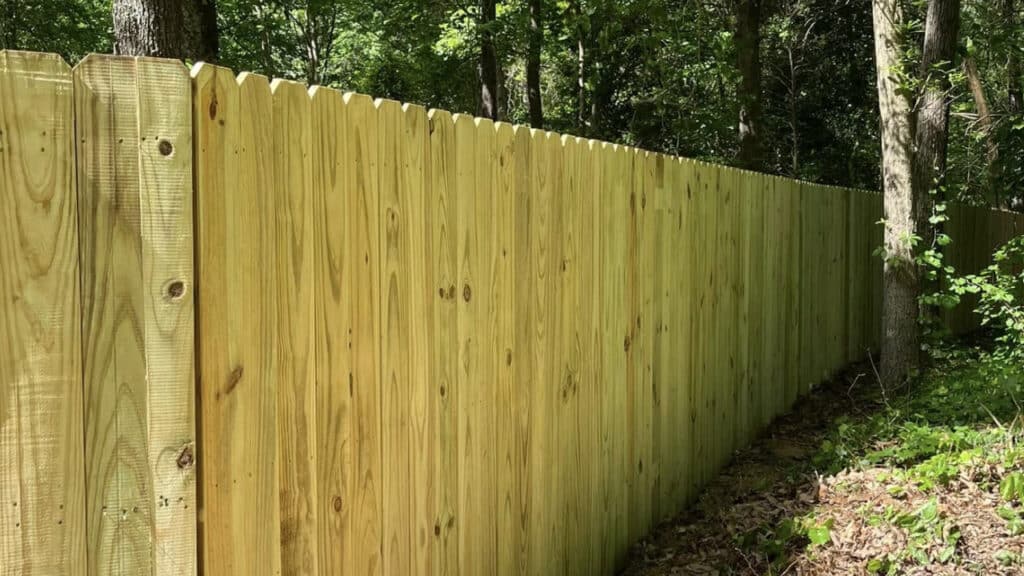
Many homeowners don’t realize there’s a middle option between full DIY and complete professional installation. Pre-fabricated fence panels and fence kits offer a compromise that can provide savings with reduced complexity.
Pre-Fab Panel Installation
Home improvement stores sell pre-fabricated fence panels that significantly reduce installation time and complexity. These panels come in standard 6 or 8-foot sections and eliminate the need to build individual pickets or privacy boards. Installation involves setting posts and attaching panels, which most handy homeowners can accomplish.
Pre-fab panels typically cost $25-45 each for wood privacy panels and $40-80 for vinyl panels. While more expensive per linear foot than building from scratch, they save substantial time and often produce more consistent results.
Fence Kit Options
Complete fence kits include all materials needed for installation: posts, panels, hardware, concrete, and instructions. These kits cost more than buying individual materials but ensure compatibility and often include customer support. Expect to pay $15-25 per linear foot for wood fence kits and $20-35 for vinyl kits. Want a full side-by-side comparison of both options? Read our guide: Build vs Buy Fence in Bellwood VA – What’s Cheaper in 2025?
The main advantage of fence kits is reduced complexity and planning time. Everything is included and sized correctly, eliminating trips back to the store for forgotten hardware or incorrect measurements.
Hybrid Approach: Materials Plus Labor
Some homeowners choose to purchase materials themselves and hire contractors for installation only. This approach can save 10-20% on total project costs while ensuring professional installation quality. However, not all contractors accept this arrangement, and you assume responsibility for material quality and availability.
Local Labor Market Reality in Bellwood
Understanding the local labor market helps explain current pricing and availability for fence installation services in the Bellwood area.
Contractor Availability in 2025
The Richmond area construction market remains busy in 2025, with most reputable fence contractors booking 2-4 weeks out during peak season (spring and fall). This high demand means contractors can be selective about projects and pricing.
Many contractors focus on larger projects for efficiency, so smaller residential fence jobs may face higher per-linear-foot pricing or longer wait times. Getting quotes from multiple contractors becomes especially important in this market environment.
Quality Variations Among Contractors
Not all fence contractors provide the same level of service or quality. Established companies with strong reputations typically charge premium pricing but deliver superior results and stand behind their work. Newer or less established contractors may offer lower pricing but potentially inconsistent quality.
When evaluating contractors, consider factors beyond price including licensing and insurance status, local references and portfolio, warranty offerings, and communication professionalism. The cheapest bid often proves most expensive when quality issues arise.
Break-Even Analysis
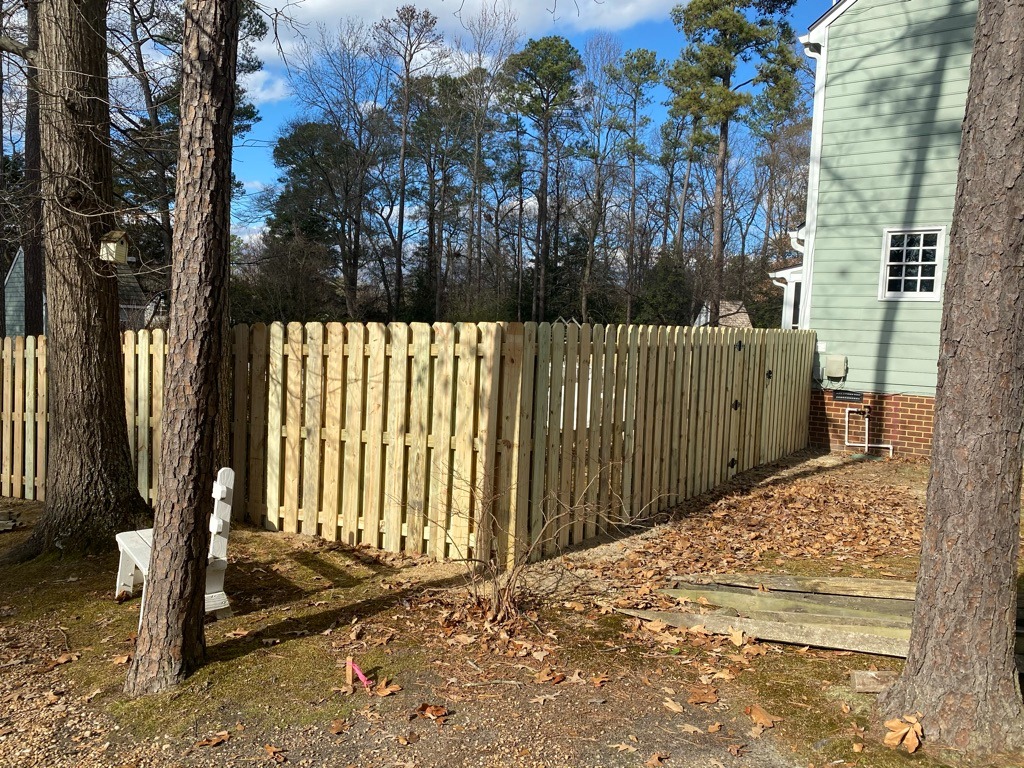
Determining whether to build or buy depends on your specific situation, skills, and priorities. Here’s how to evaluate your options objectively.
DIY Makes Financial Sense When
You have significant handyman experience and own most necessary tools already. Your time has lower opportunity cost than contractor labor rates, you’re comfortable working with concrete and power tools, and your project timeline is flexible. Additionally, if you enjoy DIY projects and view the work as recreational rather than burdensome, the experience value offsets some cost considerations.
DIY also makes sense for very simple projects like replacing individual fence sections or installing basic chain-link fencing where complexity is minimal.
Professional Installation Provides Better Value When
Your time is valuable and limited, you lack experience with fence installation, your project involves challenging terrain or soil conditions, or you need the work completed quickly. Professional installation also makes sense when you want warranty protection, your fence requires permits or inspections, or the cost difference is relatively small.
Complex projects involving gates, slopes, or decorative elements typically benefit from professional expertise regardless of cost considerations.
Making Your Decision
Use this framework to evaluate your specific situation and make the best choice for your Bellwood fence project.
Assess Your Skill Level Honestly
Rate your experience with concrete work, power tools, measuring and layout, and general construction projects. If you’re uncomfortable with any of these areas, professional installation likely provides better value despite higher upfront costs.
Consider your physical ability to handle 8-foot fence panels, dig holes in clay soil, and work in Virginia’s summer heat. Fence installation is physically demanding work that challenges even experienced DIYers.
Calculate Your True Costs
Include all costs in your comparison including materials at retail prices, tool rental or purchase, permits and inspections, your time at a reasonable hourly rate, and potential mistake correction costs.
Compare this total to professional installation quotes from licensed, insured contractors. The difference may be smaller than initially expected when all factors are considered.
Consider Your Timeline and Stress Tolerance
DIY projects take longer and create more stress than most homeowners anticipate. If you need your fence completed by a specific date or prefer to avoid the complexity of managing a construction project, professional installation offers significant advantages.
Weather delays, material delivery issues, and learning curves can extend DIY projects well beyond initial estimates. Professional contractors have experience managing these challenges and can typically provide more reliable completion dates.
Local Resources for DIY Fence Builders
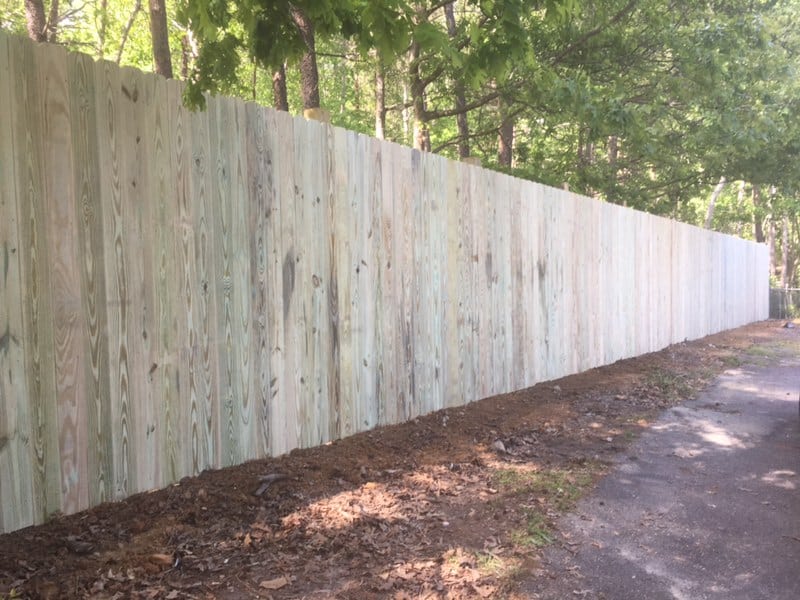
If you decide to build your own fence, these local resources can help ensure success.
Material Suppliers in the Richmond Area
Several lumber yards and specialty suppliers in the Richmond area offer better pricing and selection than big box stores. Check out 84 Lumber on Ruffin Mill Road, McCoy’s, or Fencing Supply Group in Richmond for competitive pricing and expert help.
Some suppliers offer delivery services that can save time and transportation costs, especially for larger orders. Many also provide cutting services that ensure accurate panel dimensions.
Tool Rental Options
Home Depot on Route 10, United Rentals near Centralia, and Sunbelt Rentals offer augers, saws, and everything you need. Power augers, post-hole diggers, and concrete mixers can significantly speed installation and improve results.
Consider renting higher-quality tools than you might purchase, as better equipment often produces superior results and reduces frustration.
Permit and Inspection Resources
Visit Chesterfield County’s Permit Portal or stop by the Community Development Office on Lori Road to confirm whether your project needs permitting or HOA approval—especially important if you live in Bellwood Terrace or Kingsland Woods.
The county building department can answer specific questions about setbacks, height restrictions, and inspection requirements during normal business hours.
Frequently Asked Questions
How much can I really save by building my own fence in Bellwood?
Typical savings range from $1,500-3,000 for residential projects, representing about 40-50% of professional installation costs. However, factor in your time (25-35 hours), tool rental costs ($200-400), and potential mistake corrections. If your time is worth $30+ per hour, the economic advantage diminishes significantly.
What's the biggest mistake DIY fence builders make in Bellwood?
Improper post-installation is the most costly error. Bellwood's clay soil requires specific techniques for setting posts correctly. Many DIYers also skip calling Miss Utility for line marking, which can result in expensive utility damage. Taking shortcuts on post depth or spacing leads to fence failure within a few years.
Are fence kits worth the extra cost compared to buying individual materials?
Fence kits typically cost 15-25% more than individual materials but can save 8-12 hours of planning and shopping time. They ensure all components are compatible and often include customer support. For first-time builders, the convenience and reduced complexity often justify the additional cost.
How long does professional fence installation take compared to DIY in Bellwood?
Professional crews typically complete 150-200 foot residential fences in 2-3 days, while DIY installation usually requires 3-4 weekends (24-32 hours of actual work). Weather delays, learning curves, and material trips can extend DIY projects significantly beyond initial estimates.
Do I need permits for fence installation in Chesterfield County?
Most residential fences under 8 feet don't require permits in Chesterfield County, but regulations vary by location and property type. Corner lots often have visibility requirements, and properties near easements may have special restrictions. Check with Chesterfield County's Building Department or consult a local contractor familiar with current regulations.
